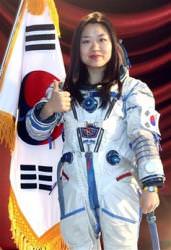

When it comes to following space agency rules, Russia stands firm. The man who was going to be the first South Korean in space has now been grounded for violating Russian security protocol and will be replaced by a female biotechnology engineer, the South Korean science ministry said on Monday. Ko San, 31, was dropped from the April 2008 flight to the International Space Station on a Russian Soyuz spacecraft. He is now the backup for the mission after he removed sensitive material from a Russian space training center. Ko, a technology researcher is being replaced by Yi So-yeon, 29, who is finishing her doctorate in bioengineering.
“The Russians emphasized the importance of abiding by the rules, as even small mistakes can bring about grave consequences in space,” a South Koren official said at a news conference, adding Ko appeared to have made innocent mistakes.
The Russian authorities said Ko took a book out of the center without permission and sent it to his home in South Korea in September. Ko later returned the book, explaining he accidently sent it home together with other personal belongings.
In February, Ko again violated regulations by getting a book from the center through a Russian colleague, and it was material he was not supposed to read. Officials did not give details about the book’s contents, but South Korean officials portrayed both of his infractions as minor.
“The Russian space agency has stressed that a minor mistake and disobedience can cause serious consequences,” a south Korean official told reporters.
Ko will remain at the Russian space center and continue training. The official did not say if Ko would possibly go to space on a future flight.
Yi, 29, will work aboard the International Space Station for about 10 days with three other cosmonauts as well as American station commander Peggy Whitson and flight engineer Garrett Reisman. Yi will conduct scientific experiments, according to a ministry statement.
The mission will make South Korea the world’s 35th country and Asia’s sixth to send an astronaut into space.
The two South Koreans were selected from a list of more than 36,000 candidates.
Original News Source: Reuters, AP
The hunt for aliens goes hand in hand with the hunt for habitable planets. Astronomers…
Computers are an integral part of space exploration, keeping them functioning when away from Earth.…
By the end of this decade, NASA, the Chinese National Space Agency (CNSA), Roscosmos, and…
Could a new, fifth force of nature provide some answers to our biggest questions about…
In 2015, the United Nations adopted the 2030 Agenda for Sustainable Development—the Sustainable Development Goals…
Astronomers have been battling threats to their clear skies on all fronts lately. One of…